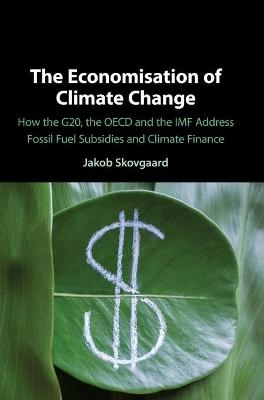
The Economisation of Climate Change
Cambridge University Press (Verlag)
978-1-108-49283-6 (ISBN)
The effort to address climate change cuts across a wide range of non-environmental actors and policy areas, including international economic institutions such as the Group of Twenty (G20), International Monetary Fund (IMF), and the Organisation for Economic Co-operation and Development (OECD). These institutions do not tend to address climate change so much as an environmental issue, but as an economic one, a dynamic referred to as 'economisation'. Such economisation can have profound consequences for how environmental problems are addressed. This book explores how the G20, IMF, and OECD have addressed climate finance and fossil fuel subsidies, what factors have shaped their specific approaches, and the consequences of this economisation of climate change. Focusing on the international level, it is a valuable resource for graduate students, researchers, and policymakers in the fields of politics, political economy and environmental policy. This title is also available as Open Access.
Jakob Skovgaard is an Associate Professor in Political Science at Lund University. His research focuses on the interaction between economic and environmental institutions and objectives in climate policy. From 2007 to 2010 he worked in the international climate change team of the Danish Finance Ministry. He is the co-editor of the books The Politics of Fossil Fuel Subsidies and their Reform (Cambridge, 2018) and Governing the Climate-Energy Nexus: Institutional Complexity and Its Challenges to Effectiveness and Legitimacy (Cambridge, 2020).
Preface; Part I. Introduction: 1. Introduction: The economisation of climate change and why it matters in the case of international economic institutions; Part II. Setting the Stage: 2. A framework for studying institutional output and its alignment, causes and consequences; 3. The three institutions, their roles and the environment; Part III. Fossil Fuel Subsidies: 4. Fossil fuel subsidies: Key issues; 5. The G20 and fossil fuel subsidy reform: The catalyst; 6. The OECD and fossil fuel subsidies: The knowledge provider; 7. The IMF and fossil fuel subsidies: The unexpected environmentalist; 8. The alignment of the economic institutions on fossil fuel subsidies: Synergies, but definitions can be divisive; Part IV. Climate Finance: 9. Climate finance: Key issues; 10. The G20 and climate finance: Introducing finance ministries to the topic; 11. The OECD and climate finance: Development and investment; 12. The IMF and climate finance: Carbon pricing rears its head; 13. The alignment of the economic institutions on climate finance: Efficiency in development and investments, but also carbon pricing; Part V. Conclusions: 14. Conclusions; References; Index.
| Erscheinungsdatum | 23.03.2021 |
|---|---|
| Zusatzinfo | Worked examples or Exercises |
| Verlagsort | Cambridge |
| Sprache | englisch |
| Maße | 175 x 250 mm |
| Gewicht | 660 g |
| Themenwelt | Naturwissenschaften ► Biologie ► Ökologie / Naturschutz |
| Recht / Steuern ► EU / Internationales Recht | |
| Technik ► Elektrotechnik / Energietechnik | |
| Wirtschaft ► Volkswirtschaftslehre | |
| ISBN-10 | 1-108-49283-5 / 1108492835 |
| ISBN-13 | 978-1-108-49283-6 / 9781108492836 |
| Zustand | Neuware |
| Haben Sie eine Frage zum Produkt? |
aus dem Bereich


